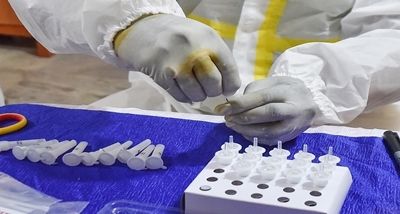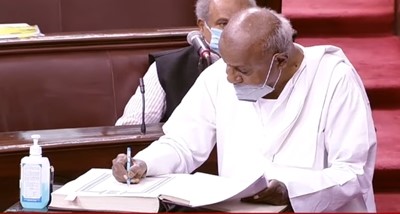Daily Current Affairs and GK | 20 and 21 September 2020

Main Headlines:
- 1. DCGI approves commercial launch of COVID- 19 Test- FELUDA.
- 2. Parliament passes Farmers’ Produce Trade and Commerce Bill 2020 and Farmers Agreement on Price Assurance and Farm Services Bill 2020.
- 3. World Alzheimer’s Day: 21 September
- 4. International Day of Peace: 21 September
- 5. Lok Sabha passes Companies (Amendment) Bill 2020.
- 6. MoU signed between AYUSH Ministry and Ministry of Women and Child Development for controlling malnutrition.
- 7. Foreign Contribution (Regulation) Amendment Bill 2020 presented in Lok Sabha.
- 8. BIS Certification granted to all products of HOCL.
- 9. Two sloth bears died in Nandankanan Zoological Park.
- 10. HD Deve Gowda takes oath as member of Rajya Sabha.
- 11. Rajya Sabha passes Epidemic Diseases (Amendment) Bill, 2020.
- 12. Government launched Nasha Mukt Bharat Abhiyan in 272 districts.
Happy February get 35% Off
Use Coupon code FEB26
1. DCGI approves commercial launch of COVID- 19 Test- FELUDA.
- Drug Controller General of India (DCGI) has approved the commercial launch of COVID-19 Test FELUDA.
- FNCAS9 Editor-Limited Uniform Detection Assay (FELUDA) has been developed by the Tata group and is powered by CSIR-Institute of Genomics and Integrative Biology (IGIB).
- Clustered Regularly Interspaced Short Palindromic Repeats (CRISPR) is a genome editing technology that is used to diagnose diseases.
- Tata CRISPR test is the world’s first diagnostic test to use Cas9 protein for detecting the SARS CoV 2 virus. It uses indigenously developed CRISPR technology.
- Tata CRISPR test has accuracy levels equivalent to RT-PCR tests. It is affordable, safe, accessible and easy to use.
- DCGI is a department of the Central Drugs Standard Control Organisation. It approves licenses of various categories of drugs in India. Its headquarters is located in New Delhi.

(Source: News on AIR)
2. Parliament passes Farmers’ Produce Trade and Commerce Bill 2020 and Farmers Agreement on Price Assurance and Farm Services Bill 2020.
- Amid the ongoing protests by farmers and opposition parties, the Farmers’ Produce Trade and Commerce (Promotion and Facilitation) Bill 2020 and the Farmers (Empowerment and Protection) Agreement on Price Assurance and Farm Services Bill 2020 have been passed by Rajya Sabha.
- The Lok Sabha has already passed the two farm bills.
- Farmers’ Produce Trade and Commerce Bill:
- It allows intra-state and inter-state trade of farmers’ produce outside the APMC markets.
- State governments shall not levy any market fee or cess on farmers for selling their produce outside APMC markets.
- Intermediaries will be eliminated and the farmers and traders will enjoy the freedom of choice of sale and purchase.
- Procurement at Minimum Support Price will continue.
- Farmers Agreement on Price Assurance and Farm Services Bill:
- It creates a framework for contract farming between farmer and buyer before the production.
- The risk of market unpredictability will be transferred to the sponsor. In case of higher market price, the farmers will get the price over and above the minimum price.
- Effective dispute resolution mechanism will be provided with clear timelines.
- The farmers will have the power to fix the sale price of his choice, and the payment will be received by them within 3 days.
- The purchasing consumer will pick up the produce directly from the farm after signing the contract.
3. World Alzheimer’s Day: 21 September
- World Alzheimer’s Day is celebrated annually on 21 September to raise awareness about Alzheimer’s.
- The theme for World Alzheimer’s Month 2020 is ‘Let’s talk about dementia’.
- Alzheimer’s is a neurodegenerative disease that leads to dementia.
- The term ‘Dementia’ is used for different brain disorders that affect memory, thinking, behaviour and emotion.
- More than 46 million people across the world are living with dementia.
- Its symptoms are memory-related difficulties, mood swings and disorientations.
- It may be inherited genetically or caused by head injuries, depression and hypertension.
- It mostly affects older people, and there is no cure for this disease.
- German psychiatrist and pathologist Alois Alzheimer described it for the first time in 1906.
4. International Day of Peace: 21 September
- International Day of Peace is celebrated to strengthen the ideals of peace, both within and among all nations and people.
- International Day of Peace was started in 1981. In 2001, the UN General Assembly adopted a resolution to designate 21 September as a period of non-violence and cease-fire.
- Theme 2020: “Shaping Peace Together”
- SDG 16: Peace, Justice and Strong Institutions

(Source: UN)
5. Lok Sabha passes Companies (Amendment) Bill 2020.
- The Companies (Amendment) Bill, 2020, has been passed in the Lok Sabha.
- The bill decriminalizes various technical and filing-related corporate offences. 48 sections of the Companies Act 2013 will be amended.
- There will be no change in the provisions of non-compoundable offences like fraud, deceit and causing public injury.
- The provisions of the bill provide the permission for direct listing of companies on foreign stock exchanges.
- The bill will introduce a new chapter related to producer organizations in the Companies Act 2013.
- As per the bill, the companies that have CSR spending obligation up to Rs. 50 lakh need not constitute a CSR committee.
- Lok Sabha has also passed the Taxation and Other Laws Bill 2020.
6. MoU signed between AYUSH Ministry and Ministry of Women and Child Development for controlling malnutrition.
- AYUSH Ministry and Ministry of Women and Child Development have signed an MoU to control malnutrition as a part of POSHAN Abhiyaan.
- Under the MoU, Ayush-based solutions and practices of Yoga and other Ayush systems will be adopted for controlling malnutrition and AYUSH will be integrated into POSHAN Abhiyaan.
- The Anganwadi worker who will give the Ayurvedic nutrition message to people at the grass-root level will be called ‘DHATRI’- Dedicated Health Activist to Replenish the Innutrition.
- #Ayush4Anganwadi campaign will be launched to create awareness about the activities that will be implemented through this MoU.
- POSHAN Abhiyaan:
- It is a flagship program of the Government of India under the Ministry of Women and Child Development.
- It was earlier known as National Nutrition Mission.
- It aims to improve the nutritional outcomes for children, pregnant women and lactating mothers.
- It was launched in 2018.
7. Foreign Contribution (Regulation) Amendment Bill 2020 presented in Lok Sabha.
- The Foreign Contribution (Regulation) Amendment Bill 2020 that aims to strengthen the compliance mechanism, increase transparency and accountability in the receipt and expenditure of foreign contribution, was presented in Lok Sabha.
- The bill seeks to amend the Foreign Contribution (Regulation) Act 2010.
- The bill prohibits public servants from receiving foreign contributions.
- It will also prohibit the transfer of foreign funding to any person or association.
- The bill also reduces the administrative expenses of an organization via foreign contributions to 20% from 50%.
- The bill makes Aadhar compulsory for NGOs and other organizations’ heads who want to receive foreign funding.
- Foreign Contribution Regulation Act:
- It regulates foreign funding and ensures that these funding are not used for such activities that pose a threat to internal security.
- It was enacted in 1976 and then was amended in 2010.
- All NGOs must register themselves under the act to receive foreign donations.
- The registration is valid for five years and can be renewed.
8. BIS Certification granted to all products of HOCL.
- All products of Hindustan Organic Chemicals Limited (HOCL) have been granted the Bureau of Indian Standards - BIS certificate.
- HOCL is also an ISO 9001 and ISO 14001 certified organization.
- Hindustan Organic Chemicals Limited (HOCL):
- It is a PSU under the Ministry of Chemicals and Fertilizers.
- Its manufacturing unit is located in Kochi, Kerala. It was incorporated in 1960.
- It is the second largest producer of Phenol and Acetone in India.
- Bureau of Indian Standards (BIS):
- It is the national standard body of India that works under the aegis of the Ministry of Consumer Affairs, Food and Public Distribution.
- It is a statutory body that was established under the BIS Act, 2016.
- Headquarters: New Delhi
- Director-General: Pramod Kumar Tiwari

(Source: PIB)
9. Two sloth bears died in Nandankanan Zoological Park.
- Two sloth bears have died in the Nandankanan Zoological Park (NZP), taking the total death toll to 3, including a Himalayan Black Bear.
- The two bears were detected with multiple hemorrhages.
- Nandankanan Zoological Park (NZP):
- It is one of the leading zoos in India.
- It is located in Bhubaneshwar, Odisha.
- It lies in the vicinity of Kanjia lake, which is a wetland of national importance.
- It is the only zoo in India that has Patas monkey, Eastern Rosella and Open-billed Stork.
- The first white tiger safari in India started in this zoo in 1991.
- It is the first zoo in India to become a member of the World Association of Zoos & Aquariums (WAZA) in 2009.
10. HD Deve Gowda takes oath as member of Rajya Sabha.
- Former PM of India and leader of Janta Dal (Secular), HD Deve Gowda, has taken the oath as a member of Rajya Sabha.
- He was the 11th Prime Minister of India (1996-1997).
- He also served as the Chief Minister of Karnataka from 1994 to 1996.
- He has been elected to Rajya Sabha from Karnataka.
- It is the first time since 1996 that the leader of Janta Dal (Secular) has been elected to Rajya Sabha.

(Source: News on AIR)
- Rajya Sabha:
- It is also called the Council of States and is the upper house of the Parliament.
- It is a permanent house as it cannot be dissolved.
- The members of Rajya Sabha have a term of six years and one-third of the members retire after every second year.
- Chairman of the Rajya Sabha administers the oath to the members.
- Vice-President of India is the ex-officio chairman of Rajya Sabha.
11. Rajya Sabha passes Epidemic Diseases (Amendment) Bill, 2020.
- The Epidemic Diseases (Amendment) Bill 2020 has been passed in Rajya Sabha. It will repeal the Epidemic Diseases (Amendment) Ordinance issued in April 2020.
- The bill seeks to amend the provisions of the Epidemic Diseases Act, 1897.
- The bill will add protections for health care service personnel fighting epidemic diseases. Any harm, injury, hurt or danger to the life of healthcare workers will be considered as a cognizable and non-bailable offence.
- It will expand the powers of the central government to take necessary measures to curtail the spread of epidemic diseases.
- The government may regulate the inspection of any ship, bus, train, aircraft leaving or arriving at any port in India. Also, the government may regulate the detention of any person that wants to travel by ship, bus, train, etc. during an outbreak.
12. Government launched Nasha Mukt Bharat Abhiyan in 272 districts.
- Lok Sabha Minister of State for Social Justice and Empowerment Rattan Lal Kataria informed the house in a written reply that the Ministry of Social Justice and Empowerment is implementing a National Action Plan for Drug Demand Reduction (NAPDDR) for 2018-25.
- NAPDDR aims to reduce the adverse effects of drug abuse through a multi-pronged strategy.
- NAPDDR has the following components:
- Awareness generation programmes in schools, colleges, universities, communities, etc.
- Community based peer-led interactions intervention programmes
- Capacity building of service providers
- Treatment facilities
- The Ministry has also launched Nahsa Mukt Bharat Abhiyaan in 272 most affected districts. The districts have been selected based on the inputs from the Narcotics Control Bureau (NCB) and findings of the Comprehensive National Survey conducted by the Ministry.
- The campaign will be implemented from 15 August 2020 to 31 March 2021.





 19 September 2020 Current Affairs
19 September 2020 Current Affairs 








Comments